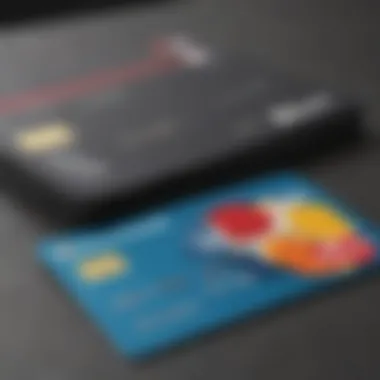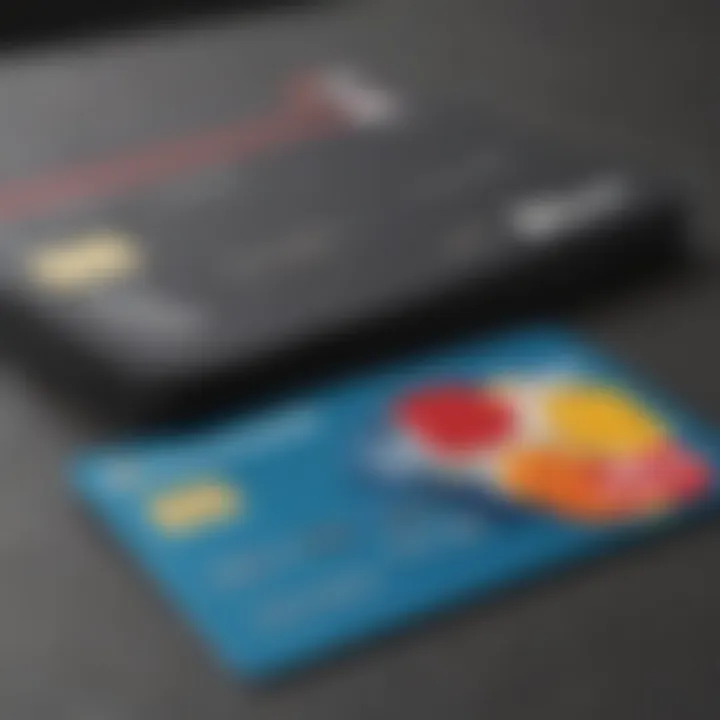Exploring Credit Cards Without Credit Checks


Intro
In today's financial landscape, understanding credit options can seem like a labyrinth for many. Especially when it comes to applying for credit cards that don’t require a credit check, the waters can get a bit murky. This article aims to unravel the details, providing a roadmap on what you need to know about these financial products.
More and more folks find themselves in situations where a credit score isn’t quite what they hoped it would be—whether due to past missteps, a lack of credit history, or simply being new to the game of personal finance. This opens up a niche market for credit cards that assess eligibility through non-traditional means. Without the heaviness of a credit check, these options can offer a lifeline to those looking to build or rebuild their credit profile.
Understanding the ins and outs of credit cards with no credit checks can lead to informed financial choices. It's not just about grabbing the first card you come across; it's about seeing the bigger picture regarding benefits, drawbacks, and personal financial health.
This is where we’ll dive in, exploring everything from definitions to application processes. Ready your mental map as we begin this journey of navigating the often intimidating world of credit.
Overview of Financial Product
Definition
Credit cards that don’t require a credit check are specifically designed for individuals who may have limited or no credit history. These cards typically look at alternative credit data, which may include factors like income, employment status, or banking history, rather than relying solely on a traditional credit score.
Key Features
- No Credit Score Requirement: Opens opportunities for individuals with poor or non-existent credit history.
- Quick Application Process: Many of these cards offer a streamlined online application that can yield instant decisions.
- Security Features: Some cards may come with added fraud protection features, giving users a sense of security.
Purpose and Benefits
The main aim of these credit cards is to provide access to credit for those often sidelined from the conventional credit system. They serve various purposes:
- Credit Building: They help in establishing or improving a credit score if used responsibly.
- Emergency Funds: They can act as a safety net for unexpected expenses.
- Everyday Purchases: Some folks use them for regular expenses, earning rewards as they build credit.
Types and Categories
When exploring credit cards that don’t require a credit check, it's useful to understand the various types available.
Credit Card Types
- Secured Credit Cards: These require a cash deposit that acts as a credit limit. Generally easier to get, they’re ideal for those starting out or rebuilding.
- Unsecured Credit Cards: Some issuers offer non-secured cards to individuals without credit history, often at a higher interest rate.
Pros and Cons
Pros:
- Access for those without traditional credit.
- Potentially faster approval times.
- Chance to build a credit score with responsible use.
Cons:
- Higher interest rates in many cases.
- Lower credit limits compared to standard cards.
- Possible fees for card maintenance, which can vary widely.
Situational Uses
These cards can be especially beneficial for:
- Students: Who may not have any prior credit history.
- New Immigrants: Who arrive without a U.S. credit history.
- Individuals recovering from financial hardship: Looking to re-enter the credit market.
Application Process
Steps to Apply
- Research Card Options: Find the cards that fit your situation by assessing fees and features.
- Prepare Required Documents: Ensure you have financial documentation on hand.
- Fill Out Application: Complete the form with accurate information.
- Submit: Send in your application for review.
Eligibility Requirements
While credit checks are not mandatory, applicants should demonstrate a steady income or be able to provide alternate financial proof to increase their chances of approval.
Documentation Needed
- Employment proof: Recent pay stubs or tax returns.
- Identification: Government-issued ID to verify identity.
- Financial history: Bank statements as a fallback verification method.
Common Mistakes to Avoid
- Not reading the fine print on fees and interest rates.
- Applying for multiple cards simultaneously, which can negatively impact your financial profile.
- Assuming that no credit checks mean unlimited accessibility without due diligence.


Tips for Success
- Always try to make timely payments; late payments can severely damage credit building efforts.
- Consider keeping the card’s balance low relative to the limit to further improve credit utilization.
- Regularly monitor your credit score to see the impacts of responsible card use.
Costs and Fees
Types of Fees Associated
When applying for credit cards with no credit checks, be mindful of associated fees:
- Annual Fees: Some cards charge yearly maintenance fees.
- Late Payment Fees: Missing a payment can lead to significant fines.
- Foreign Transaction Fees: Not all cards are friendly when used overseas, so check before travelling.
Interest Rates and APR for Loans/Cards
These cards often feature higher-than-average interest rates. It’s crucial to compare different offers to find the lowest rates.
Comparisons of Costs Across Options
In essence, while credit options exist without traditional checks, they come with their own set of financial responsibilities. It’s imperative to engage in thorough research, weigh all the costs involved, and take your time in making informed decisions that align with your financial goals.
Prolusion to Credit Cards Without Credit Checks
Navigating through credit options can feel like crossing a minefield for many, especially when one faces the dreaded credit check. The introduction of credit cards without credit checks has brought a ray of hope to those who struggle with traditional credit assessments. This segment of the financial realm is crucial as it provides insights into those pathways often overlooked by potential applicants.
Credit cards without stringent checks offer a breath of fresh air for a variety of demographics: young professionals just starting their financial journeys, families managing tight budgets, and students aiming to establish credit histories. The importance of this topic lies in its potential to empower consumers with knowledge, enabling them to make sound financial decisions.
These cards serve as tools that, when used wisely, can lay a foundation for future financial health. They create opportunities for individuals to build or improve their credit scores beyond the rigid criteria set by traditional banks. But it's not just about easy accessibility; understanding the different types of options is imperative to select the right fit.
Navigating this subject requires a careful balance of information, weighing the advantages and potential drawbacks that come with these choices. This article promises to break down those barriers, making it easier for readers to grasp the relevance of no credit check cards in today's financial landscape.
Understanding Credit Checks
Credit checks are designed to gauge an individual's creditworthiness, which essentially determines how likely a person is to repay borrowed money. Lenders consult this financial background to make informed decisions—hence the anxiety many feel when it comes time to apply for credit cards.
In general, there are two types of credit checks: soft checks and hard checks. A soft check might occur when checking your own credit or when a company pre-screens you for an offer. It doesn't impact your score. In contrast, a hard check happens when you formally apply for credit. This can dent your credit score temporarily, often leaving applicants anxious.
Why Choose No Credit Check Options
So, why would someone lean towards credit cards that promise no credit check? Well, for starters, those with thin credit files or negative histories often find the traditional routes closed off. With a no credit check route, the stakes feel lower, and the chances of approval significantly rise.
Also, these options can enable the rebuilding of credit through responsible usage, which might be the stepping stone someone needs to secure better credit deals in the future. It's this possibility of building towards something larger that can appeal strongly to folks seeking a financial comeback.
Moreover, without the looming specter of stringent checks, individuals often feel more empowered to apply. Financial decisions become less about proving past mistakes and more about forging a new path forward. As one may realize, there exists a wide array of options that suffice individual needs without the classic hurdles.
"The freedom to choose without the weight of credit checks can uplift many on their financial journeys."
In summary, the appeal of no credit checks is not just about accessibility. It's about opportunity, growth, and the chance to redefine one's financial narrative.
Types of Credit Cards Available
When stepping into the world of credit options, understanding the different types of credit cards available becomes essential. This segment serves as a beacon of clarity amidst the chaos of credit choices, particularly for those aiming to navigate their finances without a credit check. By knowing the specifics, benefits, and drawbacks of various types, individuals can make judicious decisions that align with their personal financial goals.
Secured Credit Cards
Definition and Function
Secured credit cards are a unique breed in the financial world. Essentially, these cards are backed by a cash deposit made by the cardholder. This deposit serves as collateral, which usually aligns with the credit limit. For instance, if you put down $500, that's typically your spending cap. The primary appeal of secured cards lies in their accessibility; they provide a pathway to obtaining credit for individuals with limited or poor credit history. Unlike traditional cards that require rigorous credit checks, secured cards are often much more forgiving.
Requirements for Application
The requirements for application with secured credit cards are straightforward, making them an appealing option for many. Most issuers require a minimum deposit, which can range from $200 to $1,000 or more. Additionally, proof of income and residency may be necessary, but the bar is not set very high. This low barrier to entry opens up opportunities for many who might otherwise struggle to acquire credit. It's worth noting though, that while the process is simpler, individuals need to ensure they can maintain their deposit to avoid potential fees or penalties.
Impact on Credit Score
Secured credit cards can significantly impact one's credit score if used responsibly. Payments made on time are reported to credit bureaus, adding positive data to your credit profile. Additionally, these cards often help individuals build a credit history from scratch. However, potential pitfalls exist; if an individual defaults or doesn't make timely payments, the damage can be exacerbated. So the key takeaway? Use this option wisely, treating it more like a financial tool rather than just a way to spend.
Unsecured Credit Cards
Features and Benefits


Unsecured credit cards differ from their secured counterparts in that no collateral is required. They offer a revolving credit line based on the issuer's assessment of the applicant's creditworthiness. A major draw to unsecured cards is the flexibility they provide; they allow users to spend without the restriction of a deposit. Generally, these cards come with various perks, such as rewards programs, cashback options, and travel benefits, making them an attractive choice for those who manage their finances carefully.
Banks That Offer These
Many institutions extend unsecured credit cards, but it's essential to choose one that aligns with your financial situations. Large banks like Chase, Citibank, and Discover offer a range of options. Meanwhile, credit unions often provide attractive alternatives with lower interest rates. This variety means consumers can shop around for the card that best fits their needs, looking for features like favorable rewards or lower fees, all while avoiding the headache of a credit check.
Potential Risks Involved
Unsecured credit cards come with their own set of potential risks. Their attractive features and easy accessibility can lead individuals to overspend, leading to high-interest debt. Furthermore, because these cards rely on the individual's credit profile, those with a poor credit history may face higher interest rates. It's crucial for users to keep a firm grip on their spending and remain vigilant about their repayment habits; neglecting these duties can have significant repercussions on one’s financial status.
Retail Store Credit Cards
Advantages of Retail Cards
Retail store credit cards can be enticing through various promotions and discounts offered by the stores themselves. For example, a shopper at Target might receive an instant 10% off their first purchase by signing up for their card. This type of credit option often caters to loyal customers who frequently shop at specific retailers. However, while the perks can be appealing, they need to be carefully considered amid potentially high-interest rates.
Common Providers
Many well-known retailers offer store credit cards, including major names like Walmart, Amazon, and Macy's. These cards often have specific advantages tied to the store's own ecosystem, such as exclusive sales, extended return policies, or increased credit limits after a certain period. For frequent shoppers, these benefits can lead to substantial savings, provided they manage their spending responsibly.
Usage Limitations
Despite their perks, retail store credit cards do have usage limitations. These cards generally can only be used at the issuing retailer or limited groups of associated vendors. If a cardholder tries to use their card elsewhere, they may face disappointment. Additionally, the temptation to make unnecessary purchases can offset the initial savings, making it critical for users to weigh their choices carefully.
Assessing Eligibility for No Credit Check Cards
Understanding eligibility is a critical step when considering credit cards that don’t involve credit checks. It’s not just about getting a card, it’s about obtaining one that matches your financial needs and goals. This section details key factors that determine if you can secure such cards, emphasizing their importance for those who might face challenges in traditional applications.
Income Requirements
When applying for credit cards without credit checks, income is often the first hurdle to clear. Many issuers want to ensure that applicants have a reliable source of income to manage the credit line they might be granted. This doesn’t mean you need to be rolling in dough.
- What counts as income? It can include a salary, freelance earnings, or even government benefits. The key is to prove that you can repay what you borrow.
- Documentation needed: You may need to provide pay stubs, tax returns, or bank statements as proof. Keeping your documents organized can save time and effort.
- Considerations: If you're a student or new to the workforce, don't fret. Some cards are considered with minimal income. Just be candid about your financial situation.
Age and Residency Criteria
Another important consideration is age and residency. These factors can significantly limit or expand your options.
- Legal age for applicants: In most regions, you're typically required to be at least 18 years old to apply for a credit card. This age threshold is not just a formality; it establishes your legal capacity to enter into binding agreements.
- Residency status: Issuers often favor individuals who have a stable residency and a permanent address. This doesn’t mean you have to own a home. A long-term rental agreement can also suffice.
- Foreign applicants: If you’re new to a country, some credit options may be available, usually requiring additional proof of income or cosigners.
Alternatives to Traditional Applications
As traditional application processes can sometimes feel like running a gauntlet, it’s crucial to consider alternative paths to obtaining credit cards. Here are a few options:
- Online Applications: Many financial institutions offer online applications that streamline the process. Innovative tech tools might offer quick assessments based on your income and financial habits.
- Peer-to-Peer Lending Platforms: If credit checks are a significant stumbling block, platforms that connect you with lenders can provide feasible options without the usual stress.
- Credit Unions: These member-owned organizations might have more lenient criteria for issuing credit cards without formal credit checks.
Understanding the eligibility criteria for credit cards without credit checks paves the way for smarter financial choices. Focus on your income, age, residency, and alternative routes to enhance your chances of success.
Navigating through eligibility can seem daunting at first. However, recognizing these requirements allows you to build a strategy. You’re not just a number. Instead, you’re a potential cardholder ready to make informed financial decisions.
Pros and Cons of No Credit Check Credit Cards
When considering credit options, weighing the pros and cons of no credit check credit cards is essential. These cards can provide a unique pathway for individuals seeking financial solutions, especially those who might have faced obstacles due to credit ratings. Understanding the advantages and disadvantages will aid in making informed decisions that suit one’s financial scenario.
Benefits of Easy Approval
Increased Accessibility
Increased Accessibility is a standout feature of no credit check credit cards. For a wide array of consumers, especially young professionals or those with a less-than-stellar credit history, these options can seem like a lifeline. Many individuals find themselves in situations where traditional credit cards are either elusive or fraught with procedural hurdles.
The key characteristic here is that these cards do not rely on demanding credit assessments. Instead, they often hinge on basic requirements like proof of income or employment status. This means someone with a recent job or a steady paycheck might secure a card despite lower credit scores. Such accessibility enables individuals to manage expenses more effectively, paving a path for financial stability.
However, the trade-off might include higher fees or limited credit amounts. It’s wise to compare the specific features of various cards and consider your particular financial needs. Embracing easy approval can be a smart choice, but it demands careful evaluation of associated costs.
Is Building Credit Possible?
Is Building Credit Possible? indeed is a significant inquiry for many opting for no credit check credit cards. A distressing misconception surrounding these cards is that they may not contribute positively to one’s credit score. However, some of these cards report to the major credit bureaus, providing cardholders the opportunity to build or improve their credit profiles over time.
The allure of potential credit building makes these cards appealing. When used responsibly—keeping utilization low, making payments on time—individuals can witness actual progress in their credit rankings. Still, not all cards are created equal; it's vital to confirm whether a particular card reports to credit agencies. Doing so can turn an initial disadvantage into a stepping stone toward better financial health.


Drawbacks to Consider
Higher Interest Rates
Turning the focus to Higher Interest Rates, this aspect cannot be overlooked. Many no credit check cards come with interest rates that are often on the steep side. This can be problematic, especially for those who rely on credit for ongoing purchases. While the ease of approval might be attractive, the reality of accruing high-interest debt can quickly overshadow initial benefits.
The unique feature of these higher rates often stems from the increased risk lenders perceive in offering credit to individuals with lower credit scores. Individuals may find themselves in a cycle of debt if they are not cautious, ending up paying much more than they originally intended. Therefore, understanding the potential for high interest and weighing it against immediate needs is crucial before signing on the dotted line.
Lesser Rewards and Perks
A common critique of no credit check credit cards is that they tend to offer Lesser Rewards and Perks than traditional options. Individuals looking for cash back, travel points, or other incentives may discover these benefits nearly non-existent with no credit check cards. This factor can deter those who value rewards in their spending.
The unique feature of being offered minimal rewards often reflects the limited risk appetite of providers. Providers are typically cautious in extending attractive perks, leading to more straightforward credit mechanisms that tend to prioritize safety over rewards. For someone who spends significantly on a credit card, this could mean lost savings or benefits compared to utilizing better-rewarded cards.
Ultimately, while no credit check credit cards can serve as a useful tool, one must engage in extensive research and introspection. Knowing the positives while acknowledging the downsides can empower consumers to make decisions tailored to their unique financial realities.
Alternatives to Credit Cards Without Credit Checks
Exploring alternatives to credit cards that don’t require credit checks is crucial for individuals who may find themselves boxed in by traditional lending criteria. These alternatives provide ways to manage finances and even build credit, without the extra hurdle of being evaluated on past repayments or current scores. They can be preferable choices, unlocking easier paths for anyone looking to maintain some degree of financial independence.
Prepaid Debit Cards
Functionality and Use Cases
Prepaid debit cards serve as a solid option for those wanting to navigate their spending without the risk of crippling debt. They function similarly to a standard debit card, but require you to load them with money beforehand. This characteristic makes them a beneficial alternative. You can only spend what you’ve prepaid, which encourages responsible financial habits.
A common use case is for students managing their living expenses or families keeping tabs on their budgets. The intuitive nature of these cards means individuals can track their spending closely without worrying about overdrafts or exceeding limits. Furthermore, with acceptance at numerous places that accept debit, they offer a sense of flexibility.
"Using a prepaid card often feels less like being tethered to debt and more like embracing a straightforward spending tool."
Fees and Limitations
However, it’s essential to glance at the limitations tied to prepaid debit cards. They often come with various fees—activation fees, monthly maintenance fees, and withdrawal fees. Such costs can add up over time, tarnishing the initially favorable notion of a prepaid debit card.
Essentially, if you’re not careful, the card can become more of a financial burden than a help.
Additionally, prepaid debit cards do not contribute to credit scores since they aren't linked to any line of credit. So, if you’re looking to build credit while managing your finances, it might seem like a missed opportunity. It’s a balancing act, where you must weigh the fees against the convenience.
Credit Building Loans
Mechanics of Credit Building Loans
Credit building loans function in a somewhat unusual way and are a nifty tool for those wanting to beef up their credit score without entering the murky waters of credit cards. The framework operates on the concept of borrowing a small amount of money—this amount is typically held in a bank account until you pay it back in full. It feels like putting something in the piggy bank while borrowing at the same time.
Once you finish paying it off, you have the original amount back plus an improved credit rating due to timely payments. This approach is straightforward and helps many young adults or anyone without an established credit history. It’s essentially a win-win situation.
How They Can Help Your Credit Profile
By engaging with credit building loans, individuals can have a direct impact on their credit profiles. Every on-time payment shows up positively on credit reports, providing solid evidence of creditworthiness over time. It’s simple: payment history accounts for a significant part of most credit scoring models
People often overlook the importance of consistent payments. The act of getting into this habit can lead to amplified scores and future lending options. Additionally, it's generally a gentler way to build credit, especially for those wary of accruing credit card debt. The mechanics present an accessible method to ease into the world of credit with much less risk.
Navigating alternatives offers valuable insights into how individuals can approach their financial situations without relying heavily on credit card offerings that demand checks. Understanding each option's nuances can ultimately lead to greater financial literacy and security.
End: Making Considered Financial Choices
In the ever-evolving landscape of personal finance, navigating credit options demands careful consideration. This article has illuminated various pathways for acquiring credit cards without the burden of credit checks. As we wrap things up, it’s essential to acknowledge a few pivotal points that can guide your decisions moving forward.
Evaluating Your Financial Situation
Before diving headfirst into the world of credit, take a moment to evaluate your financial situation critically. This involves more than just a simple glance at your bank account or credit score. You should ask yourself:
- What are my monthly income and expenses?
- Do I have any outstanding debts, and how do they impact my available credit?
- Am I looking for credit to build my score, or do I need immediate financial relief?
Creating a personal budget can be quite enlightening. Take your time laying out all your fixed and variable costs; this will give a clearer picture of what you can afford and help you determine whether a no credit check credit card fits into your financial strategy. Remember, a credit card can be a double-edged sword. While it offers a safety net, it can also plunge you deeper into debt if not managed wisely.
The Importance of Credit Education
When it comes to credit, understanding is key. Knowledge can truly be your financial ally. Being able to distinguish between secured and unsecured cards, for example, offers more control over your financial future. By intertwining education into your credit journey, you empower yourself to make smarter, informed choices.
- Learn about Interest Rates: Knowing how APR affects payments can save you from surprises down the road.
- Understand Credit Reports: Regularly reviewing your reports helps you detect errors and monitor your credit health.
- Seek Resources: Websites such as Wikipedia and Britannica have valuable insights into credit management.
Investing the time in understanding these elements can be the difference between financial independence and stagnation. As every step forward in managing your credit builds confidence, it also fosters better financial habits.
"Education is the most powerful weapon which you can use to change the world."
– Nelson Mandela



